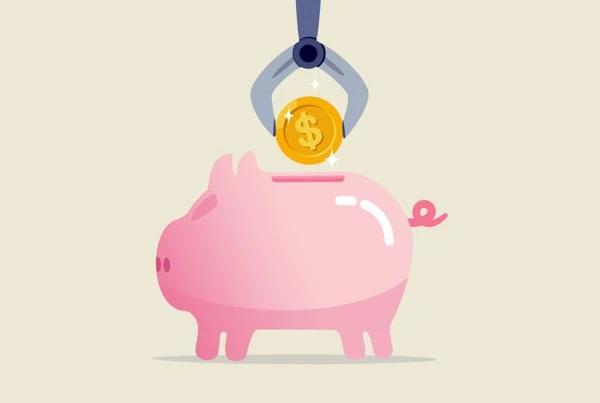If you’re fortunate, this is a question you may currently face: What do I do with the extra money I have left over after paying for all of my expenses? Make no mistake, this is a great problem to have. Call it an embarrassment of riches.
According to the Federal Reserve, Americans only save 6.2% of their incomes as of September 2018. Sure, this savings rate could represent an artificially low number because most people likely spend more than they should. Others likely save a lot more. The point is, this is a measure to demonstrate why I call having money left over after paying for your expenses an embarrassment of riches. Feel lucky to be in this boat.
The question now is what to do with this savings. Multiple options are available to you. You can invest in an IRA, put money in the market using passive ETF investing, or a multitude of other options.
Another common choice is paying off debt. This encompasses all kinds of debt, but for the purposes of this post, let’s stick to what often represents the largest source of debt for an individual: a home mortgage.
Featured Financial Products
No-Lose Situation
Your choice may depend on your stage in life, job tenure and certainty, risk tolerance, financial goals, and other factors. Some might choose to invest and pay off student loans simultaneously while maximizing their expected return within their risk tolerance. The important consideration is what makes you feel the happiest.
Mathematically (and financially), the best choice is almost always to carry the mortgage. However, whether you’re a high-earning doctor carrying a doctor loan with a budget to match or a teacher pinching pennies, most will like the idea of living debt free. Financial freedom holds a lot of value in terms of peace of mind.
When deciding to pay off your mortgage faster, this situation is an example where the smart financial decision might not align with the smart psychological decision. Regardless, you find yourself in a no-lose situation. Paying off a mortgage faster puts you one step closer to financial independence.
Let’s look at the pros and cons of paying off your mortgage early to see where you fall.
The Pros and Cons to Paying Off Your Mortgage Early
Why You Might Want to Pay Off Your Mortgage Faster:
- Guaranteed Return vs. Expected Return – When you make the decision to pay off a debt, you don’t need to burden yourself with calculating your returns along a spectrum of possible outcomes. You receive a guaranteed return equal to the interest rate of your mortgage. The S&P 500 stock market index has averaged roughly 10% per year since 1929, but the average is not what your typical return could be in any given year. It is your expected return. Investing in the stock market comes with risk. If you don’t feel comfortable with this risk, paying off your mortgage faster seems like a good alternative.
- Home Equity – Like a Savings Account – When you make payments on your mortgage, you build equity in your home. Equity can be seen as a “store of value” on par with a savings account. So, by extension, when you pay off your mortgage faster and your home appreciates in value, this can be seen as putting money in a savings account. This equity can be tapped when needed through home equity loans.
- If You’re Paying Private Mortgage Insurance (PMI) – If your current mortgage payment includes PMI, or insurance meant to cover the lender in case you can’t make good on your payments, this added expense might skew the math to favor paying off your mortgage faster. Typically, in cases where you put down less than 20% at mortgage origination, the lender will require PMI until you reach this threshold or you pay off the loan entirely.
- Sense of Relief and Security – As mentioned above, there comes a sense of relief when paying off a mortgage. I can’t empathize yet, but I can only imagine there’s immense relief when this string of payments ceases. There is peace of mind from knowing if the economy hits the skids, you lose your job, or some other financial setback befalls you, you will at least have a place to live.
- Interest Deductibility Affected by Tax Reform – The 2018 tax reform legislation signed into law at the end of 2017 significantly lowered marginal income tax brackets for the vast majority of Americans. A consequence of this shift, however, is the change in the after-tax cost of mortgage financing on your primary residence. The standard deduction amount essentially doubled, hindering the ability to take advantage of the mortgage interest tax deduction. To illustrate, you must now have a combination of interest expense and itemized deductions in excess of $24,000 in 2018 ($31,500 in 2025) as compared to $12,700 in 2017. This can cut down a significant benefit of itemized deductions. Another complication in high cost-of-living areas (or high value real estate) is the lowered limit on qualified residence loans. In 2018 onward, couples filing jointly may only deduct interest on up to $750,000 of qualified home loans, down from $1,000,000 in 2017. For example, if you have an $850,000 mortgage, interest paid on the first $750,000 is deductible, whereas the $100,000 above the limit is not. (This same limit carries forward after passage of the 2025 tax reconciliation bill.)
As a counter, there are equally-compelling reasons to keep a mortgage on the books for as long as possible.
Why You Might Not Want to Pay Off Your Mortgage Faster:
- You Believe You Can Earn a Higher Expected Return Elsewhere – This consideration and the next are why it almost always makes sense to carry the mortgage and invest the extra payments you would have made into a higher-earning asset. Currently, long-term mortgage rates are incredibly low relative to history. This makes it more logical to choose investing in the stock market or other assets with better returns. But much like the first decision above, you should note the expected return vs. guaranteed return component.
- Tax Advantages (Interest Deductibility) – The interest paid on up to $750,000 in principal on your mortgage is tax-deductible and lowers your effective mortgage interest rate. This shouldn’t be the sole motivating factor to keeping a mortgage, but it certainly is a factor.
- Inflation is a Debtor’s Friend – Assuming you have a fixed rate mortgage, your principal and interest payments are fixed for the life of the loan. The longer you hold the mortgage, the less you stand to pay on an inflation-adjusted basis. Essentially, you pay in real (current) dollars for a mortgage payment made in the past. If you’re a debtor, inflation is your best friend. If you’re accumulating assets, inflation erodes their value and is the enemy.
- Liquidity – A final consideration for why you might not want to pay off your mortgage faster is the value of liquidity. If you choose to hold off making extra payments on your mortgage and you want or need cash, keeping the mortgage is a better option. Once you send the extra payment to your lender, it can be difficult to unlock the added equity.
The Choice is Your’s on Paying Off Your Mortgage Early
When fully weighing your options about the decision to pay off your mortgage early, you shouldn’t make this decision in a vacuum.
One key consideration I offered was what to do with fixed rate debt during a period of rising interest rates. In that case, I walked you through my decision not to accelerate payments on my fixed rate mortgages. I felt my low rates presented far too good of an opportunity to continue compared to other alternatives available to me.
Again, this comes from an economic perspective. I valued seeking a higher expected return because I recognized the low interest rates on our mortgages were very advantageous compared to what the market offered. You can use this mortgage calculator to compare the benefits of investing in the stock market or paying off your mortgage early.
As an added benefit, the interest deductibility lowers the mortgage costs even further.
To illustrate the lower rate from interest deductibility, we are in the 25% marginal income tax bracket. Converting this to a decimal and subtracting it from 1 leads to 0.75. From here, I multiply my mortgage rate of 4.50% and 3.675% by 0.75 to arrive at effective interest rates of 3.375% and 2.76%, respectively. Those are some very low rates.
Another consideration for continuing my mortgages as planned is maintaining the optionality of selling the property. This lets us raise funds for a down payment on a house my wife and I will buy together. In that scenario, adding extra payments to our mortgage makes little sense as an option for my funds.
However, all things being equal, if you value getting out of debt beyond maximizing returns, paying off your mortgage faster makes sense for you. And if relieving you of your mortgage is your goal, you should consider paying off your mortgage faster.
Featured Financial Products
Further Reading: 10 Simple Steps for Creating a Budget in Excel



![Check Out the New 401(k) Contribution Limits for 2026 [Save More for Retirement] 2 number blocks switching from 2025 to 2026.](https://youngandtheinvested.com/wp-content/uploads/2025-to-2026-blue-background-1200-600x403.webp)

![7 Best Microsavings Apps [Save Money, Reach Your Goals] 4 best microsavings apps](https://youngandtheinvested.com/wp-content/uploads/best-microsavings-apps-600x403.webp)
